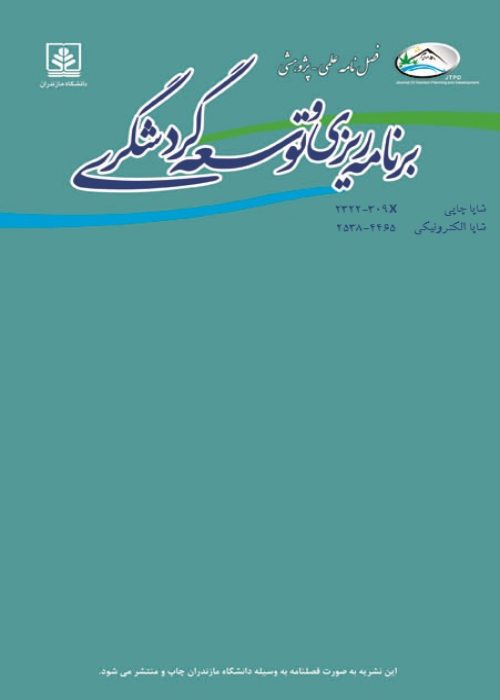The analysis of the causal relationship of social capital and sustainable development of tourism (Case study: Sari city)
Author(s):
Article Type:
Research/Original Article (دارای رتبه معتبر)
Abstract:
The goal of present study is to investigate the causal relationship between social capital and sustainable development of tourism. To achieve the goal of this research, survey method was used in this study. The study population consisted of citizens in Sari. The sample size software was used to determine pass through a sample size of 640 people is estimated. In this study, a multi-stage stratified cluster sampling was used, and questionnaire was used for data collection. Research findings have shown that variable social trust and network variables, respectively, the highest (0/383) and lowest (0/156) the effect on the dependent variable (sustainable development of tourism). The results also show the positive effects of social capital (networks of relationships, social participation, social trust) on the sustainable development of tourism, which means that the increase of social capital, the average increase sustainable tourism development.
In the current study it was attempted to investigate the relationship between social capital and sustainable development of tourism.
Discussion and Results: Descriptive finding of the study show that the mean of social capital among the whole population under study was 4.74 out of 10 and the mean of sustainable development of tourism was 4.58 out of 10. Referential findings also show that social capital along with the relationship network, social confidence, and social collaboration has significant effects on sustainable development of tourism. It was also found that social capital (the relations network, social cooperation and social confidence) has a positive impact on sustainable development of tourism meaning that with the increase in social capital the mean of sustainable development of tourism the local community improves positively.
Introduction
One of the basics of sustainable development is a good performance and cooperation from the host community. Experience also shows that without cooperation and support of the local community sustainable tourism industry cannot be created (Choi and Jamal, 2009). One of the factors that plays an important role in achieving sustainable development is the social wealth among the public which is used today along with human, financial and economical wealth. This concept is concerned with bonds and relationships between members of a social network which achieves its aims though creation of norms and mutual confidence (Alvani and Seyed Naghavi, 1381).In the current study it was attempted to investigate the relationship between social capital and sustainable development of tourism.
Materials and Methods
The methods research method is survey. The statistical population in this study is the citizens of 18 years and older of Sari city. In the present study, a pass software was used to determine the sample size. Confidence quotient in the study was set at 0.999 and error quotient is 0.001. Therefore, based on 0.999 confidence quotient and considering the least standard deviation and error of standard deviation, the size of the population was calculated to be 640. In this research, a multistage cluster sampling method proportional to volume has been used.Discussion and Results: Descriptive finding of the study show that the mean of social capital among the whole population under study was 4.74 out of 10 and the mean of sustainable development of tourism was 4.58 out of 10. Referential findings also show that social capital along with the relationship network, social confidence, and social collaboration has significant effects on sustainable development of tourism. It was also found that social capital (the relations network, social cooperation and social confidence) has a positive impact on sustainable development of tourism meaning that with the increase in social capital the mean of sustainable development of tourism the local community improves positively.
Conclusions
In development, social wealth is composed of three characteristics: confidence, mutual relationships, and cooperation. If these elements are strong in societies, the settlers in these societies have more opportunities in building the economy and society. Development might impact the relationships between the settlers with each other and with the host society. A considerable part of the literature in social development of tourism indicates that in the first stage of planning for tourism development the role of the society and benefiters must be defined. The importance of social wealth is that mutual confidence increases cooperation by reducing the costs of dealing as people are not forced to pay for controlling others' behavior and instead create confidence for group operations.Keywords:
Language:
Persian
Published:
Journal of Tourism Planning and Development, Volume:7 Issue: 25, 2018
Pages:
46 to 71
magiran.com/p1899411
دانلود و مطالعه متن این مقاله با یکی از روشهای زیر امکان پذیر است:
اشتراک شخصی
با عضویت و پرداخت آنلاین حق اشتراک یکساله به مبلغ 1,390,000ريال میتوانید 70 عنوان مطلب دانلود کنید!
اشتراک سازمانی
به کتابخانه دانشگاه یا محل کار خود پیشنهاد کنید تا اشتراک سازمانی این پایگاه را برای دسترسی نامحدود همه کاربران به متن مطالب تهیه نمایند!
توجه!
- حق عضویت دریافتی صرف حمایت از نشریات عضو و نگهداری، تکمیل و توسعه مگیران میشود.
- پرداخت حق اشتراک و دانلود مقالات اجازه بازنشر آن در سایر رسانههای چاپی و دیجیتال را به کاربر نمیدهد.
In order to view content subscription is required
Personal subscription
Subscribe magiran.com for 70 € euros via PayPal and download 70 articles during a year.
Organization subscription
Please contact us to subscribe your university or library for unlimited access!


